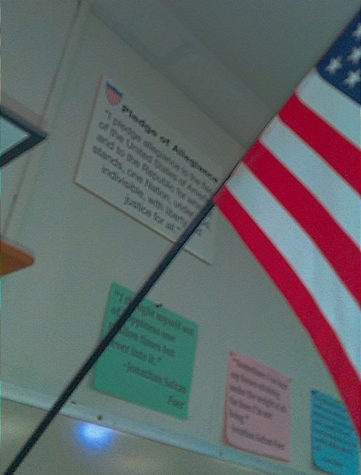Patriotic or Pedantic? The Pledge of Allegiance
December 16, 2022
It is 7 am, on a Monday morning, you sit down in class and, immediately after the bell rings, stand back up. It’s the daily pledge of allegiance. “I pledge allegiance to the flag of the United States of America and to the republic for which it stands one nation, under god indivisible with liberty and justice for all.” then you sit back down as if nothing happened. The day continues as if you didn’t just participate in some semi-cult-like patriotic behavior.
That may seem like a pretty over-the-top phrase used to describe the pledge, and anyone who continues reading is making that choice to learn the opinions of SPASH students. You can agree or you can disagree but either way, there is no disputing that the pledge of allegiance is an outdated tradition supported for the wrong reasons.

What is the pledge?
The Pledge of Allegiance was written in August 1892 by the socialist minister Francis Bellamy. In 1923, the words, “the Flag of the United States of America” were added. Then later, in response to the Communist threat of the times, President Eisenhower encouraged Congress to add the words “under God,”
UShistory.org tells us that at one point the pledge was begun with the right hand over the heart, and after reciting “to the Flag,” the arm was extended toward the Flag, palm-down. You can probably see why that became an issue in the following years. In World War II it was changed to keep the right hand over the heart the entire time, instead of saluting similarly to the Nazis.
So overall, the pledge of allegiance was written by a socialist in protest against communism and may have even been the inspiration for the Nazi salute, or it was all just one big coincidence.
Communism? In my country?
A lot of propaganda of sorts is also put out to support the pledge of allegiance. Shirts, hats, hoodies, even wall-mounted posters so you can tell everyone in your house that “a pledge a day keeps the commies away.” But we as a country haven’t been under the “threat” of communism for years now.
So why do we continue to stand and remind our peers that we hate communism? My father, an active political facebook warrior, had a comment to share, stating, “America hasn’t been under the threat of anything but other Americans in a while.”
Along with my father, Steve Calechman wrote an article for the Boston Globe titled Schools should teach the forgotten history of the Pledge of Allegiance. In the article he states;
“Back in the 1970s and ‘80s when I was in grade school, I never understood how saying those words would make me a good American. I still don’t.”
SPASH’s Opinions
The pledge of allegiance is so ingrained in the minds of American youth, but the reasoning behind it is not. Maesyn Pollock, a SPASH senior gave me her take on the pledge:
“I think it’s really silly how we stand for the pledge. People will look at communist countries and be like they’re so brainwashed and not acknowledge what kids have to say every morning for 13 years.”
Many SPASH students had something to say about the daily pledge, one of them being Kris Van Horn, a SPASH junior. The statement was simple but brutal;
“If America won’t stand up for me I won’t stand up for it.”
Supporters
Only some people feel that way though, some support the pledge and are willing to make that known. Coline Galzin, a SPASH sophomore and French exchange student had this to say;
“I stand for the pledge. I love it. It really shows that you love your country.”
A lot of people see it as a respect thing, to show those who fought for our country respect. To stand for those who can’t. I even had the opportunity to speak with Warren Soik, son of Scott Soik, a current political candidate in the assembly election. He had a lot to say when asked about the pledge of allegiance as it was and is incredibly important to him.
“I stand because I see it as a sign of respect to the people who have died and the people who don’t stand are disrespectful to the families of those who have died for our freedom.”
He also told me about a few times he has had to convince a few students to stand because he sees it as a respectful thing to do for those who have fought or are fighting. A lot of people see it as patriotic, even if it really has no purpose anymore. There was also a law by Mississippi legislator William Shirley to push a $1,500 fine to the schools that don’t do the pledge of allegiance in the first hour of the school day.
The overwhelming majority
With this being a common occurrence, there was a survey sent out to SPASH students who were willing to participate and it found some interesting things on the topic of who stands and who doesn’t. Of the 50 people to respond to the survey, 32 said they stand, 11 said they don’t, and 7 said they do only sometimes, but that wasn’t the interesting part. The interesting part of this survey was the responses.
The second question on the survey was “why or why not” and students were told to go into as little or much detail as they wished, and boy did they. Some responses were things like “I feel obligated to do so, but I would rather not. It feels unnecessary and tedious.” or even just simple ones like “because of my religion.” Some people even tried to say that “Yes, America is bad, but go to North Korea.” As if that lessened their first statement about the USA being bad. This survey was anonymous, so no names were given, but one student wrote a lengthy response when prompted with this question, they wrote;
“I think it’s weird. The US is the only country that makes children stand and pledge loyalty every day and I think it’s verging on fascist stuff. I also think it’s weird that the pledge mentions god when there is supposed to be a separation of church and state. Also, I just am not allegiant to the US and I do not think there is liberty and justice for all here. Maybe if the country didn’t suck so much I would be more inclined to play into their weird little game.”
As well as,
“The pledge feels very cultish, being forced to stand and recite it since kindergarten feels very indoctrinating and weird. Not everyone has to be a die-hard patriot. I also feel the pledge does not hold up to its word, there is no justice and liberty for all so why should I stand and recite it blindly when it’s a lie?”
Those were both incredibly well-thought-out and long responses to a simple question, showing how much some students care and want to put their voices and opinions out there.
Some of the more supportive of the pledge answers were
“you stand for like 10 seconds… it’s not a big deal.”
along with this lengthy and patriotic response,
“Because you’re respecting our country. People say there’s nothing to respect but you are able to go to school every day and do whatever you want but you can’t do that in any other country so people need to put that into consideration..”
When it comes to those supporting and not supporting, both sides have incredibly passionate responses that truly show that they care about this topic.
So? What do I do about it?
Some people like it, and some people don’t, but one thing that no one can debate is that the pledge of allegiance is an old tradition that we, as a state and as school districts, continue to use for the wrong reasons. I remember when I started to not stand for the pledge for my own reasons. I was called a terrorist, unpatriotic, disrespectful, and a slew of other words that you should never call anyone, let alone a child. I also know that some people who really support the pledge and make that known get mocked or shot down by some of those who don’t.
With all that being said, I think it is obvious that we need to stop pushing the pledge of allegiance on people who don’t believe that it is necessary anymore and need to stop criticizing those who continue to do it when we don’t know their reasonings. Obviously, the pledge is not a requirement in schools, but no one should feel like an outcast because they do or don’t participate in this daily ritual.






































































